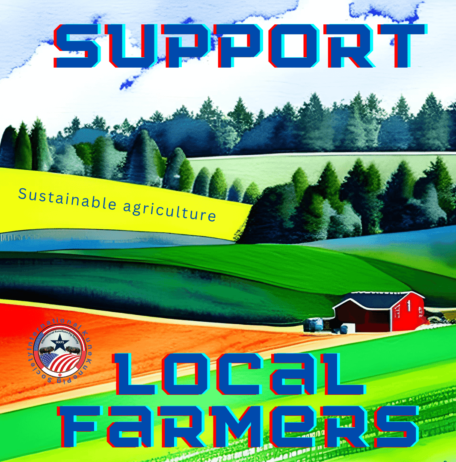
Sign Up
Want to receive a newsletter to learn more about KuneKune pigs and other educational information? Sign up to have them delivered right to your inbox.
We look forwarded to sending you some great info.

Support Your Local Farmers
Sustainability in
Agriculture
What It Means and Why It Matters
Sustainability in agriculture is more important than ever. Discover what it means, why it matters, and how it can benefit farmers, consumers, and the planet.
First, it is important to understand what sustainability means. Sustainability in agriculture refers to the practice of producing food in a way that is environmentally, socially, and economically responsible. Important to note, with the growing concern over climate change and the impact of agriculture on the planet, sustainable farming practices have become increasingly important. In this article, we'll explore what sustainability in agriculture means, why it matters, and how it can benefit farmers, consumers, and the planet.
Defining Sustainability in Agriculture.
So, sustainability in agriculture is a complex concept that encompasses a range of practices and principles. At its core, sustainability in agriculture means producing food in a way that meets the needs of the present day without compromising the ability of future generations to meet their own sustainability. Likewise, this involves balancing environmental, social, and economic considerations to create a system that is both productive and resilient. Some key principles of sustainable agriculture
include minimizing the use of non-renewable resources, reducing waste and pollution, promoting biodiversity, and supporting local communities.
Consequently, Biodiversity is all the different kinds of life you'll find in one area—the variety of animals, plants, fungi, and even microorganisms like bacteria that make up our natural world. Each of these species and organisms work together in ecosystems, like an intricate web, to maintain balance and support life. (“What is biodiversity? | Pages | WWF - World Wildlife Fund”) This is from Wildlife Organization regarding Biodiversity.
Farming Livestock in Pasture Settings
Raising livestock in pastures instead of being confined to factory farms has many benefits, not only to the environment but to the livestock and people. Likewise, sustainable livestock productions mean raising in pastures that are managed and animals are free to move about and graze freely. Furthermore, sustainability farming systems means that the waste of one element helps another. So, grass-fed animals' manure is helping rebuild the soil and replenish it with nutrients to repeat that cycle. Consequently, if those pastures are not overstocked or mismanaged.
Most importantly, the animals that are being raised in pasture and wooded settings are healthier and happier. They are living the lives of cattle, chicken, pigs, and other animals should. Free to explore, interact with humans and other animals.
The Importance of Sustainable Agriculture.
Sustainable agriculture is crucial for the health of our planet and the well-being of future generations. Furthermore, by adopting sustainable practices, farmers can reduce their environmental impact, conserve natural resources, and promote biodiversity. Therefore, consumers can benefit from healthier, more nutritious food that is produced in a way that is ethical and responsible. Likewise, by supporting local farmers who practice sustainable agriculture, we can help to build stronger, more resilient communities. Sustainability in agriculture is about creating a system that works for everyone, now and in the future.
Benefits of Sustainable Agriculture for Farmers.
Sustainable agriculture practices can benefit farmers in many ways. By reducing the use of harmful chemicals and promoting natural pest control methods, farmers can save money and improve the health of their soil and crops. Furthermore, sustainable practices can also help to conserve water and other natural resources, reducing the cost of irrigation and improving the long-term viability of the farm. Additionally, by adopting sustainable practices, farmers can differentiate themselves in the marketplace and appeal to consumers who are looking for ethically produced, environmentally friendly products.
How our Farmers are helping.
First, supporting local farmers is especially important. Our livestock farmers are humanely raising our food in their pasture-based systems. Likewise, they always provide access to fresh water and are supplemented with vitamins and/minerals needed to maintain the health of their herds and flocks. Furthermore, they are making sure that the animals have access to adequate shelters to protect the livestock from the elements.
Most importantly, farming livestock is not an easy job. Likewise, they are working 365 days a year so we can certainly do our part in supporting their efforts in way of purchasing directly from our farmers. So, with all their hard work, we can support them by purchasing from them.
Benefits of Sustainable Agriculture for Consumers.
Let us face it, consumers are becoming aware of how their meat is being cared for and where their meat, eggs and chicken come from. Likewise, the more educated the consumers become, the more important this becomes to them. Most importantly, sustainable agriculture practices not only benefit farmers, but also consumers.
By reducing the use of harmful chemicals and promoting natural pest control methods, sustainable agriculture can lead to healthier and safer food products. Additionally, sustainable agriculture can help to preserve biodiversity and protect natural habitats, which can have positive impacts on the environment and the health of local communities.
Consumers who prioritize sustainability can feel good about supporting farmers who are committed to ethical and environmentally friendly practices. Consequently, consumers know that pasture raised livestock is a much healthier option for them as well. As a result, the meat of pasture raised animals is darker and has more nutritional benefits as well. Furthermore, meat is lower in calories, lower in total fat and pasture raised meat has more vitamins and healthier levels of omega 3 and omega 6. This is an area that KuneKune really succeeds.
Benefits of Sustainable Pasture Raised Animals
Animals that are allowed to roam freely, graze and forage through the pastures tend to be healthier and under less stress than the one kept in confinement. Likewise, these animals tend to be healthier and more disease resistant, which certainly saves them on medications, supplies, and vet calls. Therefore, this also helps the farmers with costs and expenses.
Benefits of Sustainable Agriculture for the Planet.
Sustainable agriculture practices have numerous benefits for the planet. First, by reducing the use of harmful chemicals and promoting natural pest control methods, sustainable agriculture can help to preserve biodiversity and protect natural habitats. Secondly, this can have positive impacts on the environment and the health of local communities. Additionally, sustainable agriculture can help to reduce greenhouse gas emissions and mitigate climate change. Likewise, by using practices like crop rotation and cover cropping, farmers can improve soil health and sequester carbon in the soil. Overall, sustainable agriculture is a crucial component of efforts to
create a more sustainable and resilient food system.
How you can support Local Farmers
Most importantly, supporting local farmers is well worth the effort. You will get better products direct from the farmers and what you get will be healthier as well. First, find ways to purchase from farmers by using farmers markets. Likewise, you can check on social media for a farmer near you as well. Social media is now an immensely powerful tool to use as well. You can also contact your Community Supported Agriculture operations departments (CSA). You can also go to specific breed registries to find farmers near you. For IKKPS, we have a farm classified section which has a breeder that sells cuts of pork. Furthermore, you can also visit the KuneKune Breeders list to find a breeder near you.
You can also check with local butchers as they will have a list of farmers that utilize their services and may even have pasture raised beef, pork, chickens, and other specialty items available as well. Remember that there is always an option to purchase in bulk. Likewise, fill your freezers or consider purchasing half or whole animals that are ready for harvest.
In conclusion
Everyone does better with sustainable farming practices; the planet, the consumers, the farmers, and the animals themselves. Pasture raised animal products will clearly show the difference in the products that you get from your local farmers. Chickens raised in pastures – their eggs will have a brighter orange type yolk. Butter that you get from pasture raised cows will have a darker yellow butter than what you may buy at the grocery stores. The meat will be darker for example: KuneKunes produce a deep, rich red marbled meat that outshines any pork you want to purchase from the grocery store.
So, purchase sustainable, pasture raised meats, eggs, and dairy products whenever you can. This not only helps the local farmers, but the meat is healthier for you as well. That is a win for the planet, environment, farmers, animals, and the customers!
Registry Office
17500 Hamilton Arms Court Dewitt, VA 23840